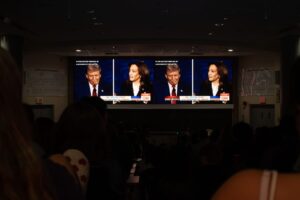Standing with a microphone before dozens of her peers in the Copley Formal Lounge, Anisa Nanavati (SFS ’26) posed a question: “What is the most meaningful way you’ve engaged with somebody of a completely different viewpoint?”
The first-year wasn’t just asking this to her peers; she was also posing the question to a Washington Post correspondent, a former senior advisor to the Democratic National Convention, and a former governor of Virginia, along with three other professionals with established careers in American politics at the Meet the Fellows Open House.
For Nanavati, questions like this come with her lived experience of having to reach across the aisle to those with differing views in her hometown of Tampa, Florida.
“I’ve always been forced to sort of defend my views as well as encouraged to take part in discourse and dialogue when it comes to bipartisanship because there is no other option,” she said.
She is, however, looking forward to discussing this idea and others with her peers and the Georgetown Politics Fellows this upcoming semester at GU Politics events, office hours, and in discussion groups. She was recently hired as a student associate for GU Politics.
The GU Politics Fellows represent a cohort of professionals with careers focused in American politics, with specialties in campaigning, legislating, and reporting. Throughout the fall semester, they will hold discussion groups and office hours, participate in events, and work with selected undergraduates through strategy teams—groups of students who collaborate with and advise the fellows.
These current fellows consist of Mary Elizabeth Taylor, who held staff positions for both the Trump administration and Mitch McConnell; Karoun Demirjian, Washington Post Pentagon correspondent; Katie Harbath, former director of public policy at Facebook; Terry McAuliffe (L ’84), former governor of Virginia; Xochitl Hinojosa, former senior advisor and communications director to the Democratic National Committee; and Alex Lundry (MPP ’04), who worked on Jeb Bush’s and Mitt Romney’s campaigns.
In an interview with the Voice, the fellows talked about bipartisanship, local government, misconceptions around how the media reports data, and the importance of conversations with those we disagree with in an increasingly divided United States. They expressed their excitement in being able to bring their real life experiences to students interested in entering the field.
“I am looking forward to just sharing my experience in the hopes that [it] resonates and folks can learn from what I’ve gone through and navigated,” Taylor said.
Similarly, Hinojosa is interested in using these small group settings to dive into what the political climate looks like in the context of upcoming elections. She hopes to use them as a space to explore careers in politics today.
“Diving into some of those real world scenarios we are seeing, so that when students are watching the news they can understand and really think through, and know exactly what is going on as we head into the midterm elections,” Hinojosa said when asked what students would be doing in her discussion group.
Demirjian, like Hinojosa, looks forward to the opportunity to directly engage with students and discuss media consumption as it relates to political engagement. For her, Georgetown students represent a community of people uniquely invested in political news and activism.
“We talk about ‘our readers, our readers, our readers,’ all the time but it is rare that you actually get to engage with a group of people who are paying attention to things,” Demirjian said.
She is excited by the prospect of hearing feedback from readers and exploring the ways in which a younger generation engages with media as paper subscriptions wane and social media becomes the primary tool through which young people access the news.
McAuliffe plans to focus on empowering students to produce tangible change in their communities. Rather than accepting the realities of the often tense bipartisan political climate of the U.S. today, he encourages students to directly affect change, using politics to produce positive outcomes.
“My goal with these students is: Get involved, you can change peoples lives. Just don’t think politics is bad and you can’t change anything. You can, if you want to do it,” McAuliffe said.
For Lundry, the first step to being involved in this way is to recognize the limitations in students’ own perspectives—and seeking out ways to break through those limitations through dialogue.
“I fear that the way we live our lives is increasingly isolated. We live in homogenous communities and we don’t expose ourselves to differing opinions,” Lundry said. “Progress is made through difficult conversations.”
The manner in which students facilitate those conversations is also important, according to Harbath. For her, difficult bipartisan dialogue means little if not backed up with some sort of compromise.
“When you’re having these conversations and you’re trying to have that end product, you have to start to trade off things that are important to you,” Harbath said.
Taylor agrees that finding a middle ground is essential, and adds that the first step in productive communication is quality listening. Rather than thinking ahead to the next thing to say, she advises students to deeply consider where those with different perspectives are coming from.
“When you’re having a conversation with someone who you don’t agree with and they start to speak, just take stock of where your mind goes,” Taylor said. “Are you actively listening and trying to take in what they are saying and understand it or are you immediately just thinking, ‘How do I counter this?’”
The conversations that Taylor and Harbath describe—with compromise and listening—are what the fellows hope to facilitate in their groups. In the midst of a polarized country, especially ahead of the midterms, they all hope to produce an environment of both mutual respect and constructive dialogue.





